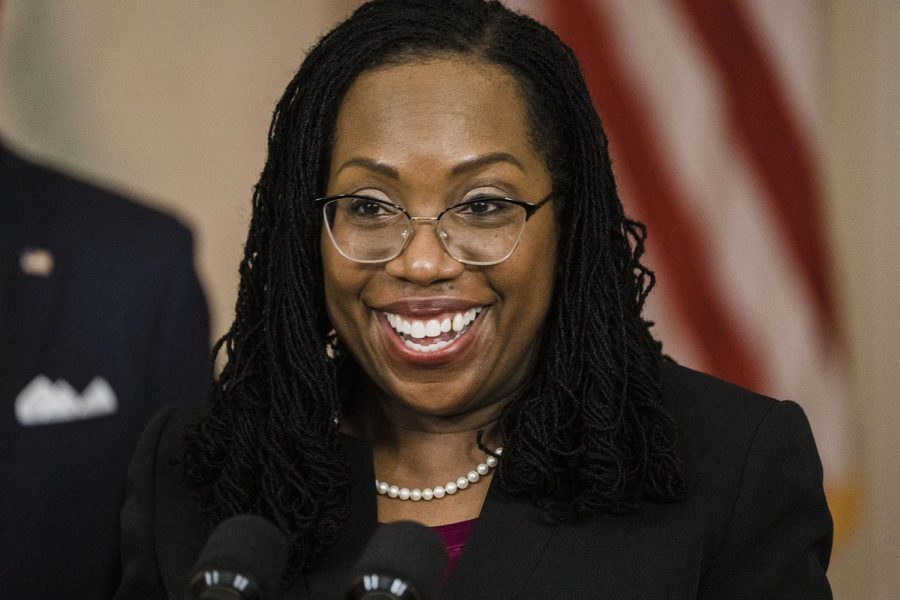Opinion: Supreme Court Justice Jackson would benefit the United States
President Biden’s Justice nominee would bring new perspectives to the highest court in the country
Kent Nishimura / Los Angeles Times / TNS
Judge Ketanji Brown Jackson delivers remarks on her nomination by President Joe Biden to serve as Associate Justice of the United States Supreme Court from the Cross Hall of the White House on Friday, Feb. 25, 2022, in Washington, D.C. Sen Amy Klobuchar, D- Minn., believes there will be bipartisan support for Judge Jackson when the senate votes on her nomination.
March 21, 2022
In February, President Joe Biden nominated Judge Ketanji Brown Jackson to become the 116th Associate of the U.S. Supreme Court. The nomination followed Stephen G. Breyer’s decision to retire from the Court after this year’s term. Having Jackson as a Justice will be to the United States’ benefit, as she has an impressive resume and brings new perspectives to the Court.
Jackson was born in Washington, D.C. to parents who attended segregated schools. In high school, she was told to not set her sights so high after expressing interest in attending Harvard’s law school. Eventually, she graduated from Harvard twice, with honors, and became an editor of the Harvard Law Review. Since then, she has held several positions in the field and was called “one of the nation’s brightest legal minds” by the White House.
In its 233-year existence, the Supreme has had only two African-American Justices and four female Justices. Having Jackson, a Black woman, as a Justice would provide the Court with much needed diversity. According to Forbes, diversity in the workplace “helps provide insight into the needs and motivations of all your customer base, rather than just a small part of it.” Throughout its history, the Court has handled cases like Dred Scott v. Sandford and Roe v. Wade where a Black or female perspective would have been crucial, but there wasn’t any. Having diverse individuals like Jackson in the Court will help ensure that all Americans are taken into account when making decisions. This is especially important at the Supreme Court level, since their decisions directly impact all Americans and generations to come.
Aside from bringing diversity to the Court, Jackson also brings an impressive resume with her. Since graduating from Harvard, she has focused on serving the public. In the 2000s, she worked as a federal public defender, representing those who couldn’t afford a lawyer. If the Senate were to confirm her, she would be the first former federal public defender. Jackson also became a U.S. Sentencing Commissioner, focusing on reducing unwarranted and unjust sentences. Currently, Jackson is a judge in the U.S. Court of Appeals, where she reviews final orders from D.C.’s Superior Court. Clearly, Jackson is focused on serving and helping the people, which is an ideal quality for a Justice that will make decisions for all Americans. Her work even earned her bipartisan support when being confirmed as a commissioner and judge.
With all the experience Jackson has in criminal justice, she could bring much-needed reform to the prison system. The United States has the highest incarceration rate in the world — an issue Jackson has tried to combat. Under Barack Obama, she aided in releasing 79 non-violent drug offenders from jail after they received unfair sentences. When working as a public defender, Jackson represented Guantanamo Bay detainees, giving her a perspective in the much-debated military prison. Most of the Court’s Justices are not as well versed in prison system issues like Jackson is, making her a great addition to the Court. As senior director of the Fair Courts Program Lena Zwarenstey said, “Having a bit more balance when it comes to who is helping decide matters of life and death for so many people is very important.”
Starting Mar. 21, the Senate Judiciary Committee will begin confirmation hearings for Jackson’s nomination. The plan is to finish hearings and reach a Senate vote by Apr. 8. If she is confirmed, the day will mark a major win for women, people of color, and reformers.











